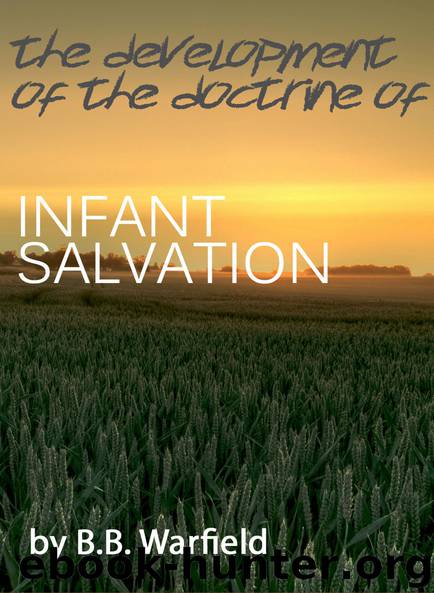The Development of the Doctrine of Infant Salvation by B.B. Warfield

Author:B.B. Warfield [Warfield, B.B.]
Language: eng
Format: epub, mobi
Publisher: Primedia eLaunch
Published: 2011-11-18T19:25:03+00:00
VII. "ETHICAL" TENDENCIES
The most serious peril which the orderly development of the Christian doctrine of the salvation of infants has had to encounter, as men strove, age after age, more purely and thoroughly to apprehend it, has arisen from the intrusion into Christian thought of what we may, without lack of charity, call the unchristian conception of man's natural innocence. For the task which was set to Christian thinking was to obtain a clear understanding of God's revealed purpose of mercy to the infants of a guilty and wrath-deserving race. And the Pelagianizing conception of the innocence of human infancy, in however subtle a form presented, put the solution of the problem in jeopardy by suggesting that it needed no solution. We have seen how some Greek Fathers cut the knot with the facile formula that infantile innocence, while not deserving of supernatural reward, was yet in no danger of being adjudged to punishment. We have seen how in the more active hands of Pelagius and his companions, as part of a great unchristian scheme, it menaced Christianity itself, and was repelled only by the vigor and greatness of an Augustine. We have seen how the same conception, creeping gradually into the Latin Church in the milder form of semi-Pelagianism, lulled her heart to sleep with suggestions of less and less ill-desert for original sin, until she neglected the problem of infant salvation altogether and comforted herself with a constantly attenuating doctrine of infant punishment. If infants are so well off without Christ, there is little impulse to consider whether they may not be in Christ.
The Reformed churches could not hope to work out the problem free from menace from the perennial enemy. The crisis came in the form of the Remonstrant controversy. The anthropology of the Remonstrants was distinctly semi-Pelagian, and on that basis no solid advance was possible. Nor was the matter helped by their postulation of a universal atonement which lost in intention as much as it gained in extension. Infants may have very little to be saved from, but their salvation from even it cannot be wrought by an atonement which only purchases for them the opportunity for salvation—an opportunity of which they cannot avail themselves, however much the natural power of free choice is uninjured by the fall, for the simple reason that they die infants; while God cannot be held to make them, without their free choice, partakers of this atonement without an admission of that sovereign discrimination among men which it was the very object of the whole Remonstrant theory to exclude. It is not strange that the Remonstrants looked with some favor on the Romish theory of poena damni. Though the doctrine of the salvation of all infants dying in infancy became one of their characteristic tenets, it had no logical basis in their scheme of faith, and their proclamation of it could have no direct effect in working out the problem. Indirectly it had a twofold effect. On the one hand,
Download
The Development of the Doctrine of Infant Salvation by B.B. Warfield.mobi
This site does not store any files on its server. We only index and link to content provided by other sites. Please contact the content providers to delete copyright contents if any and email us, we'll remove relevant links or contents immediately.
| Book of Common Prayer | Catechisms |
| Devotionals | Hymns & Hymnals |
| Meditations | Monasticism & Asceticism |
| Pentecostal & Charismatic | Prayerbooks |
| Rites & Ceremonies | Sacraments |
More Language of Letting Go: 366 New Daily Meditations by Melody Beattie(2456)
To Light a Sacred Flame by Silver RavenWolf(2358)
How Proust Can Change Your Life by Alain De Botton(2266)
The Secret Power of Speaking God's Word by Joyce Meyer(2259)
Curse Tablets and Binding Spells from the Ancient World by Gager John G.;(1515)
A TIME TO KEEP SILENCE by Patrick Leigh Fermor(1501)
The Gnostic Gospel of St. Thomas by Tau Malachi(1414)
Anxious for Nothing by Max Lucado(1406)
7 Secrets of Divine Mercy by Vinny Flynn(1395)
From Good Goddess to Vestal Virgins: Sex and Category in Roman Religion by Ariadne Staples(1347)
365 Tao: Daily Meditations by Ming-Dao Deng(1306)
To Ride a Silver Broomstick by Silver RavenWolf(1284)
all by Unknown Author(1243)
Anam Cara by John O'Donohue(1230)
To Stir a Magick Cauldron by Silver RavenWolf(1221)
The Sacred Enneagram by Christopher L. Heuertz(1202)
The Fasting Edge by Jentezen Franklin(1187)
100 Days of Thanks by Thomas Nelson(1178)
The Poems of Rowan Williams by Rowan Williams(1073)
